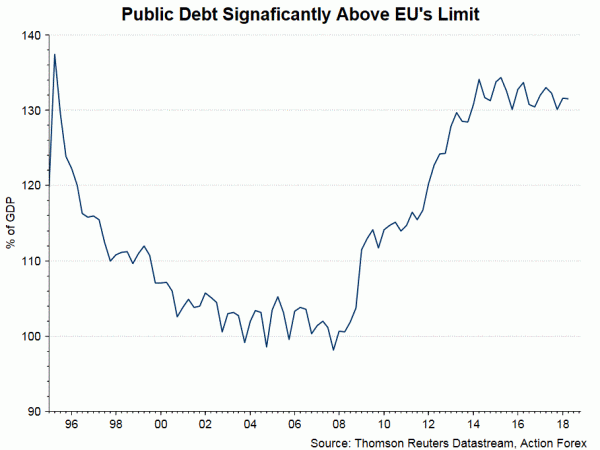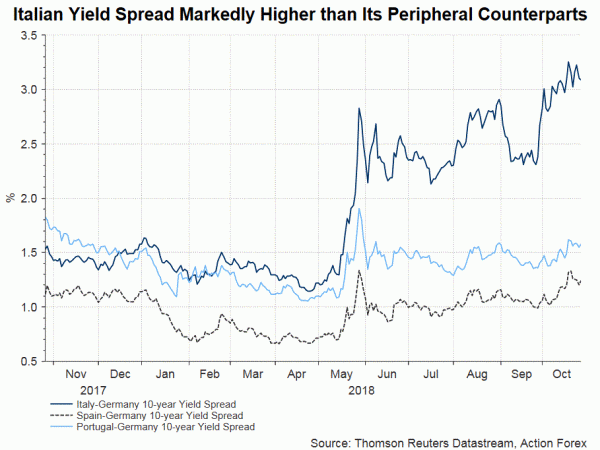Italy’s budget problem continues to haunt. S&P refrained from downgrading Italy’s sovereign credit rating, keeping it at BBB, two notches above junk grade. Yet, the relief might just be temporary as the rating agency has placed the country in “negative” watch, suggesting a downgrade can come with the 24-month period.Moody’s went further a week ago by announcing a downgrade to Baa3, making the country’s rating just one notch above junk. With a “stable” watch, such rating should likely stay for the coming 12-18 months. Fitch and DBRS have not released review schedule yet.
S&P
S&P forecasts that Italy’s budget deficit would reach +2.7% of GDP in 2019 and 2.5% in 2020, higher than government’s estimate of 2.4% and 2.1%, respectively. The agency indicates that the country’s public debt, at 131.2% of GDP last year, would steady at around 128.5% over the coming 3 years. this comes in contrast with the government’s expectation of a decline. Moreover, it has revised lower the GDP growth estimates to +1.1% for this year and in 2019, compared with +1.4% previously. As S&P noted in the press released, “the Italian government’s economic and fiscal policy settings are weighing on the country’s economic growth prospects, a critical driver of government debt-to-GDP trajectory”. Moreover, “the government’s planned economic and fiscal policy settings have eroded investor confidence, as reflected by a rising yield on government debt”.
Moody’s
Similarly, Moody’s expects Italy’s budget deficits at around 2.5% of GDP in each of the coming three years. Moreover, the debt-to-GDP ratio would “remain broadly stable” at the current 130%, instead of decreasing gradually over coming years. The agency warns that “Italy’s high debt level severely limits the authorities’ ability to use fiscal policy to cushion any future economic downturn, which will inevitably come”. The economic growth outlook remains dismal despite the aggressive budget plan. Fiscal stimulus could only boost growth in the “near term”. Moody’s forecasts Italy’s annual GDP growth would hover around +1% “at best in the years beyond the temporary fiscal stimulus”.
Our Stance
We believe further downgrades are likely. Last week, European Commission rejected Italy’s draft budget plan as it has violated EU’s budget rules under the Stability and Growth Pact. The two major rules are 1) a state’s budget deficit cannot exceed 3% of its GDP and 2) the national debt cannot exceed 60% percent of its GDP. The country has to submit a revised plan within 3 weeks. It is the first time that the EC has asked a country member to resubmit a draft budget plan. We are doubtful of the populist government would revise the plan so that it complies with all required rules. So far, the populist government has stood firm in their position.
Italy passes the first criteria, even according to both S&P and Moody’s estimates. However, it appears impossible to meet the second criteria anytime the medium term. The country’s current debt-to-GDP ratios stays at an elevated 130% level, more than doubling EU’s rule. Worse still, both S&P and Moody’s expect the situation won’t improve in coming years.
Further downgrades not only dampen market sentiment, but also further hurt Italy’s financing capability. A downgrade to junk level might shut the country from accessing funding from the international market. Meanwhile, foreign official institutions, usually holding investment grade bonds in their reserve, would have to reduce their holdings in Italian bonds if the rating was downgraded.
There have been much talk about ECB’s purchase of Italian bonds. Should Italian government bonds fall to junk level, they would become ineligible for the ECB’s PSPP. While ECB is expected to end the entire QE program in December, it would be prohibited from re-investing the proceeds in Italian bonds, if they are junk. Note, however, that ECB would desert Italian bonds only if its rating is placed ALL four rating agencies (Fitch, Moody’s S&P and DBRS) in junk. While it takes rather long time for an agency downgrade a rating by one notch, it would be prudent for us to make assessment on the likelihood of such scenario after knowing ECB’s reinvestment plan (likely in December).
| Agency | rating | Outlook | Notch above Junk Grade | Last Review |
| DBRS | BBB (high) | Stable | 3 | Jan 13, 17 |
| Fitch | BBB | Negative | 2 | Aug 31,18 |
| Moody’s | Baa3 | Stable | 1 | Oct 19, 18 |
| S&P | BBB | Negative | 2 | Oct 26,18 |


